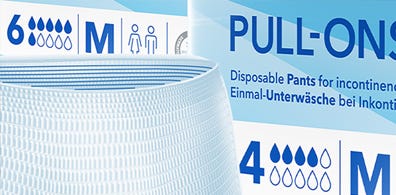Nocturia & Nocturnal Enuresis (Adult Bedwetting)



Nocturia and nocturnal enuresis are two types of nighttime urination that can occur in adults. While they may sound similar, there are some key differences between the two conditions.
Nocturia, for example, is where you wake up several times during the night to urinate – something which can greatly affect your quality and quantity of sleep as well as your overall wellbeing. Nocturnal enuresis, or adult bedwetting, is when you involuntarily urinate while you’re still fast asleep – something you may remember doing as a child.
However, nocturnal enuresis is different to wetting the bed as a child. This is because, in most cases, childhood bedwetting is caused by either not using the bathroom before bed, stress at home or school, or not feeling the urge to use the bathroom while sleeping.
As an adult, however, the underlying causes for nocturnal enuresis can be different and, while much rarer than child bedwetting, is estimated to affect between one and two per cent of UK adults.
At Attends, we understand that both nocturia and nocturnal enuresis can cause embarrassment and sleep problems for people with these conditions and their caregivers. That’s why we’ve written this article to teach you all you need to know about how to manage both conditions effectively.
Causes of nocturia and nocturnal enuresis
There are multiple different potential causes of nocturia and nocturnal enuresis but there are many reasons why you may need to urinate more during the night or end up wetting the bed.
Caffeine and alcohol
Nocturnal enuresis and nocturia can both be caused by what you drink and how much. Caffeine, for example, stimulates your bladder and increases urine production, so it’s easy to see how drinks like coffee and tea can contribute towards these conditions.
Alcohol is also a diuretic which means it can cause you to urinate more. And since many people will typically drink alcoholic drinks in the evenings, this means that when you go to sleep, the diuretic properties may still take effect throughout the night.



Medications that can cause nocturia and enuresis
Taking certain medications may cause nocturnal enuresis and nocturia. For example, some medications used to help with mental health conditions can have side effects such as acting as a diuretic. This can lead to nocturia, especially when your body is first getting used to the medication.
Medications used to treat sleep disorders can also increase your risk of nocturnal enuresis. Although these are designed to help you sleep, they may also cause you to miss the cues needed to wake up and head to the bathroom.
If you’re worried that your medications are causing nocturia or nocturnal enuresis, speak with your doctor. But don’t stop taking it unless advised they tell you to.
Changes to your bladder
In some cases, your bladder can’t store urine as well as it should. This may be because your bladder is smaller than needed or you have bladder overactivity.
Bladder overactivity is where the muscles in your bladder walls are less stretchy and tighten when they should relax. This can cause you to need to urinate much more frequently and without much warning, greatly increasing your risk of nighttime bedwetting and nocturia.
If you’re experiencing symptoms of bladder overactivity, make sure you speak with your doctor or local continence service so they can provide with you medical support.
Increased urine production at night
Sometimes, your kidneys are simply unable to reduce the amount of urine they produce at night.
Normally, your body produces an antidiuretic hormone called arginine vasopressin which causes your kidneys to produce less urine at night.
However, if your body doesn’t make enough of this hormone, your urine production will remain the same and could lead to an increased risk of nocturia and nocturnal enuresis.
These low levels of arginine vasopressin may be caused underlying health conditions. Some of the key signs you may have low arginine vasopressin levels include needing to urinate more and having excessive thirst. If you’re concerned, speak with your doctor for further support.
Urinary tract infections (UTIs)
Nocturnal enuresis may be a sign of type one or two diabetes; uncontrolled diabetes can lead to frequent urination.
If you have diabetes, your body struggles to process glucose properly, which may cause an increased production of urine. Having an increased urine production puts you at a higher risk of nocturnal enuresis and nocturia.
Type one or type two diabetes
Nocturnal enuresis may be a sign of type one or two diabetes; uncontrolled diabetes can lead to frequent urination.
If you have diabetes, your body struggles to process glucose properly, which may cause an increased production of urine. Having an increased urine production puts you at a higher risk of nocturnal enuresis and nocturia.
Other medical conditions
As well as diabetes, there are other health conditions which may increase your risk of nocturia and nocturnal enuresis.
These conditions can include:
● Anxiety
● Kidney infection
● Oedema (swelling of the legs)
● Obstructive sleep apnoea
● Neurological disorders such as Parkinson’s disease or multiple sclerosis
These conditions may cause bladder overactivity or problems with your bladder's capacity to hold urine.
Urinary tract obstruction
An obstruction or blockage in your urinary tract, such as your urethra (the tube where urine flows down and out of your body), can lead to nocturnal enuresis.
These blockages can be caused by things like bladder stones, kidney stones or, in men, having an enlarged prostate, which can all lead to bladder overactivity and eventually, nocturnal enuresis.
How to live with nocturia and nocturnal enuresis
While it can be challenging to live with nocturia and nocturnal enuresis, there are certain things you can do to try and limit their occurrence.
Some of the best ways to manage your nocturia and nocturnal enuresis at home include:
● Cutting down on alcoholic drinks and avoiding caffeine (especially later in the day) and switching to decaf
● Managing uncontrolled diabetes
● Speaking with your doctor about your medications to determine if they’re diuretics, and finally, always using the bathroom before going to bed
It can also be useful to keep a bladder diary that details what you drink, how many times you urinate during the day and night, and any other symptoms you experience. This way, you can notice any patterns that may help you get to the bottom of your condition.
Incontinence products can also be useful when living with nocturia and nocturnal enuresis. At Attends, we offer a wide range of incontinence products that can be used during the night to protect you (and your mattress) from any involuntary urination that may occur.
By making the right lifestyle changes, you may soon find that living with incontinence isn’t as difficult as it once was.



How to treat nocturia and nocturnal enuresis
Generally, lifestyle changes are tried first as they can usually provide you with relief. If they don’t help, medication or surgery may be recommended to target the underlying cause.
Some common treatments for nocturia and nocturnal enuresis include:
Suppressant medications – if your nocturia and nocturnal enuresis are caused by your kidneys making too much urine at night, you may be provided with medication to reduce their nighttime production. This medication is taken before bed and you may not be able to drink an hour before and eight hours afterwards.
Bladder relaxation medication – if your condition is caused by your bladder muscles over-tightening, you may be prescribed medications that help to keep your bladder relaxed. This way, your bladder will be able to hold more urine overnight and reduce your risk of nocturia and nocturnal enuresis.
Prostatectomy and urethra dilation – if you have an enlarged prostate, having a small part or all of it removed may help with nocturia and enuresis. Likewise, if you have an obstruction caused by a narrow urethra, you can have it dilated (stretched) to help alleviate your symptoms.
Bladder stone removal – a urinary tract obstruction caused by bladder stones will need to be treated and surgery is often the best way to remove the stones.
With so many different ways to treat nocturia and nocturnal enuresis, it’s important to speak with your doctor as they can confirm which one is right for you.
Supporting nocturia and nocturnal enuresis with Attends
While they may be difficult conditions to deal with, nocturia and nocturnal enuresis can be managed and, in some cases, even treated. With the right lifestyle changes and personalised treatments, you should be able to easily minimise your risk of nighttime urination.
Learn more about our range of continence products that could be used at night. Take a look at our wide range of products. Filtering them to suit your specific needs, should make it much easier to find the solution you need to feel more confident about going to bed at night.
Sources
● Bladder & Bowel - Nocturnal Enuresis
● National Library of Medicine - Nocturnal Enuresis & Nocturia, Differences & Similarities
● Bladder & Bowel UK - Bedwetting Adults
● National Library of Medicine - Arginine Vasopressin Disorder (Diabetes Insipidus)
● NHS - Diabetes Insipidus - Causes
● National Library of Medicine - Nocturia

Sexual Health & Incontinence

Which Medications Can Cause Incontinence?

Incontinence in Young Women: Key Causes

Nocturia & Nocturnal Enuresis (Adult Bedwetting)

How To Stop Urine Leakage When Coughing



